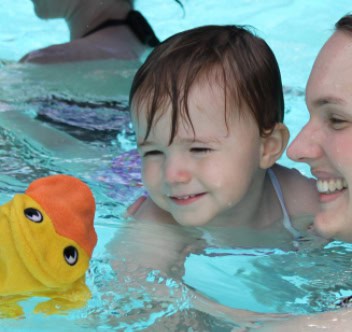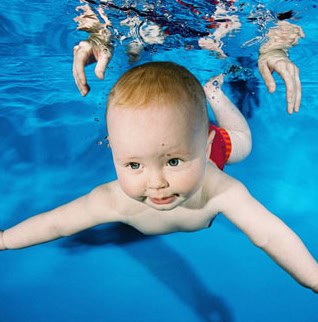Teaching your baby to swim might help them overcome their initial fear of water and provide a great excuse to have some fun and exercise at the same time, but it could have other benefits as well.
Recently, researchers from Norway and Britain found that children who had taken baby swimming classes did better on tests involving gripping and reaching as well as balance, compared to children who had no experience swimming as babies. This helps their physical progress later in life as well, along with providing them with some essential social skills.
All babies have primitive and postural reflexes, one of which is the Mammalian Diving Reflex, which is strong between 0-6 months. The Mammalian Diving Reflex is most well developed in children, and is gradually decreased with age. It enables them to naturally breath-hold when submerged, and this can be seen quite clearly when you plunge your baby into the water during a swimming lesson or in the family pool. When baby’s face enters the water covering their forehead and nose area; the body automatically redistributes the blood flow ensuring the 'key' organs such as the brain and heart, receive a constant supply of oxygen.
This reflex is perfectly natural and leaves around eight months of age. Gradually this reflex turns into the 'Dive Response', which continues into adulthood. As your baby is only submerged for a matter of seconds during a lesson, it is the 'Dive Response' that then kicks in and helps them as they learn to swim. Swimming lessons will ensure that they are comfortable with this reflex, and see them becoming happier and more confident in the water.


Gross and fine motor skills are also strengthened and coordination and balance are enhanced in babies who enter the water early. For this reason the younger your little one starts in lessons the easier the transition is to enjoying the water. A baby who is used to being stationary can move about independently in the pool as they learn balance and coordination. The motion and sensation of the water gives them an awareness of self that otherwise would not be gained at such a young age, and sets them up for life.
Additionally, early experiences in water allow little ones to better develop their psychomotor skills, because there they can move more freely and begin to understand concepts of distance and movement. Their cardio-respiratory system is also strengthened as the baby exercises his or her heart and lungs.
On the whole, a child who starts lessons early is far more relaxed and happy in the water, and in a country as water loving as New Zealand this is vital.
Based in Silverdale, Northern Arena has four cutting-edge, heated pools – all indoors. The pools are treated by ultra violet light similar to the way drinking water is treated, allowing for a low level of chlorine that makes them ideal for babies and those with sensitive skin. All of their lessons are designed to be fun as well as educational, enhancing enjoyment and confidence in the water.
Have a think about popping your child in the water whatever the time of year – you’ll be helping them on the way to knowing how to save themselves in the water, increase their learning ability and have a lot of fun while they’re at it!